Stupid Poll Tricks
Polls matching President Obama against potential Republican contenders are entertaining but not informative.
While some Republicans continue to fantasize about running Jeb Bush in 2012, the latest Fox News poll [PDF] shows him getting demolished, 34 to 54, in a hypothetical match-up with President Obama were the election held today.
As always when these silly polls come out, I remind readers that the election won’t actually be held today. That’s a significant fact, especially this far out. Most notably, we haven’t had a campaign yet. Which means that all we’re gauging with these polls is some combination of name recognition and fuzzy favorability.
From the same poll, here are the percentages of registered voters and Republicans, respectively, who think the various Republican candidates whose names have been mentioned as possible 2012 contenders “would make a good president.”
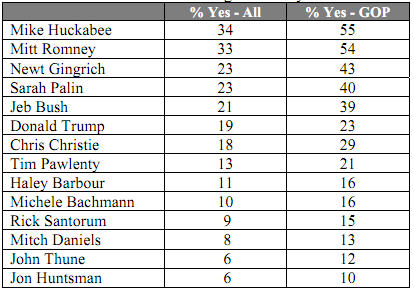 Is Mike Huckabee really more than four times better than Mitch Daniels and almost six times better than John Thune? Doubtful. But he’s a relatively known quantity, having raised his national profile by running for president in 2008. Ditto Mitt Romney, who’s statistically tied with him among both registered voters and Republicans.
Is Mike Huckabee really more than four times better than Mitch Daniels and almost six times better than John Thune? Doubtful. But he’s a relatively known quantity, having raised his national profile by running for president in 2008. Ditto Mitt Romney, who’s statistically tied with him among both registered voters and Republicans.
Newt Gingrich and Sarah Palin, who are statistically tied with Jeb Bush in the next tier of contenders, are very well known nationally. But they’ve both got considerable baggage. Jeb Bush is almost certainly less well known as a personality — most people outside Florida likely know little about him other than that his dad and brother were both president — but has much lower negatives.
Aside from Donald Trump, who’s a national celebrity but an unknown as a politician, the remainder of the field are almost complete unknowns.
Indeed, lots of people admitted they’d never heard of Chris Christie (37%), Tim Pawlenty (45%), Haley Barbour (42%), Michele Bachmann (41%), Rick Santorum (46%), Mitch Danield (49%), John Thune (53%), and Jon Huntsman (55%). I’d guess that most of the people answering “Yes” to Mitch Daniels, John Thune, and Jon Huntsman would have trouble picking them out of a lineup, much less explaining why they’d make good presidents.
When half of registered voters have never heard of you, it’s a wee bit early to ask them whether you’d make a better president than the guy currently in the Oval Office. All that tells you, really, is what they think of Barack Obama. Indeed, Obama gets between 48% and 56% o f the “votes” regardless of which Republican he’s being pitted against. The poll doesn’t ask about all the matchups but of those they do:
Obama 48, Romney 41
Obama 49, Huckabee 41
Obama 56, Palin 35
Obama 55, Gingrich 35
Obama 54, Bush 34
All of the Republicans have plenty of time to move their numbers. My strong inclination is that Gingrich and Palin are stickier, since they’re much better known, and would have an almost impossible time overtaking Obama absent a catastrophic fall in his approval ratings. (And I strongly suspect both Gingrich and Palin damned well know it and have other agendas than replacing Obama.)
via Taegan Goddard


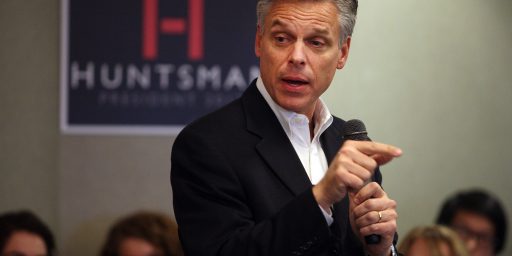
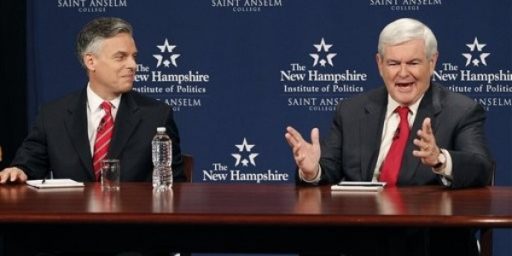
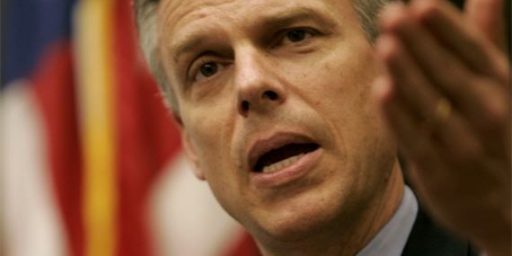
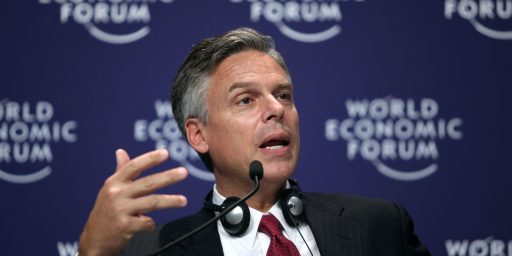
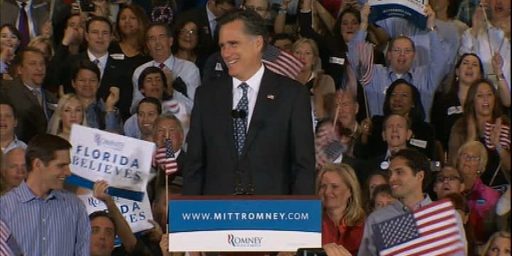
This is strictly entertainment and of course meaningless. That said absent a catastrophic fall in Obama’s approval which never really collapsed and has been steadlily rising for two months, he’s going to be fairly hard to beat.
Joe,
As James and I have both said here a few times in past months, the odds should always in favor of a President being re-elected. In the 20th century, an incumbent President who stood for re-election was only defeated four times (Taft, Hoover, Carter, and Bush 41). In each case. there was either a serious economic downturn or a strong third-party candidacy involved (in the case of the 1992 election it was both).
I think Jeb’s last name is hurting him more now than it would after a serious campaign. He doesn’t really have any name recognition except what is associated with his brother (and to a far lesser extent his father). But Jeb is very different from George W., and I think that his numbers would significantly improve once people saw that.
That said, he’s no tea party conservative, so his chances of winning the Republican primary are probably significantly less than his chances of winning the general.
These polls are not much more but for entertainment at this time. More detail polls and trends are more informative but those are not what we get and even hose need to be taken with a bucket of salt.
As for President not being re-elected in the 20th century, four not doing so is not that small of number although you lift out at least one Ford. . There were only 17 Presidents in “20th century” and at least two never ran for second term (Harding, Kennedy). When I get time I will look at it in more detail but that is at max 5 to 10 which is 1/3 odds which isn’t bad.
You might also consider Truman and LBJ, who were both eligible to run for a third term but opted out due to low approval numbers.
Perhaps more significantly, Carter is the only president in the last century to have succeeded a president from a different party and then lost reelection. It’s very rare for the country to vote a party out of the White House after just four years. (It happened a few times in the 19th century, but through fluky, weird incidents: Polk never ran for a second term due to failing health, and Benjamin Harrison split Grover Cleveland’s presidency into two pieces due by defeating him in the Electoral College but not the popular vote.)
I suspect this has to do with the fact that the conditions responsible for changes in the party controlling the White House rarely worsen in a four-year period. Obama, like Reagan and FDR, came to office in the middle of a recession, and even though economic conditions weren’t great at the end of their first term, they were markedly better. Unless there’s some kind of a double-dip recession, the economy is likely to be in better shape by Nov 2012 than it was in Nov 2008, even if it is not as good as people hope.
In contrast, when, say, Hoover was president, the economy collapsed on his watch, and the country saw it go into the toilet. Furthermore, Hoover’s party had been in office for 12 years, more than enough time for the country to be itching for a change in leadership.
Kylopod good info. I do agree incumbents tend to have an advantage. I also hope the economy turns around but I’m worried about having an energy crisis when it does.
However I would caution about using stats from such a small sample group to attempt to make any halfway reliable predictions. About like those sports stats they tend to come up with this team have never loss under this condition or another. Those stats fall to the wayside about as fast as they come up with them.